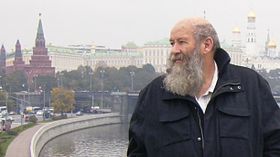H. A. Willis
| H.A. Willis | |
|---|---|

H.A. Willis, 2013.
|
|
| Born | Howard Alan Willis 15 November 1948 Colac, Victoria, Australia |
| Occupation | Essayist, critic, editor |
| Nationality | Australian |
| Notable works | Manhunt (1979), a.k.a. Bad Blood (1981) |
| Children | two |
H.A. Willis, born Howard Alan Willis on 15 November 1948, is an Australian essayist, critic and editor.
The son of a Lands Department inspector in Victoria, Willis was born at Colac and grew up at Apollo Bay, Kyneton and Ballarat. He subsequently lived in Darwin and Auckland, New Zealand (1970–80) and rural Tasmania before settling with his wife and two young sons in Perth in 1981.
As a student at La Trobe University in the late 1960s, Willis was part of a group (which also included Philippe Mora, Peter Beilby, Rod Bishop and Demos Krouskos), that wrote and produced the first issue of Cinema Papers (October 1967).
While studying at the University of Auckland, Willis was a founding member of Alternative Cinema, an Auckland film-makers’ cooperative established in 1972. He contributed articles to and edited several early issues of that group’s journal, Alternative Cinema. Willis later (1976) wrote an in-depth account of the New Zealand film industry for Cinema Papers.
Willis produced a half-hour television documentary, Stanley, filmed in October–November 1974 for NZBC. The film concerned a twelve-day manhunt (in October 1941) for mass killer Stanley Graham. Based on his interviews with participants in the manhunt, and his access to the previously closed Police files, Willis wrote Manhunt, the most detailed account of the event. The feature film Bad Blood, based on his book, starred Jack Thompson and Carol Burns. In 2012, Willis returned to Hokitika, where Graham is buried. His account of his trip to Westland and the Graham story was published in the "Travel" section of The West Australian. Willis's 2012 visit to New Zealand also generated articles paying homage to the earthquake damaged city of Christchurch and the philosopher Karl Popper (a resident of Christchurch in 1937–45).
...
Wikipedia
